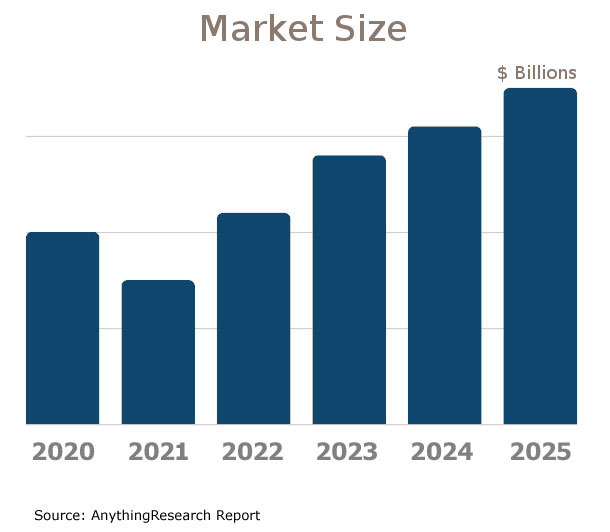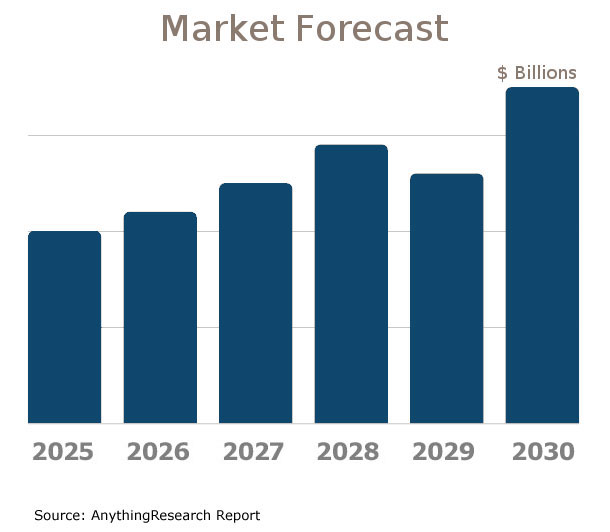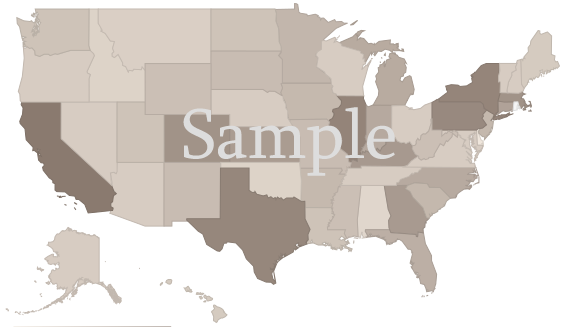| Standard Report | Premium Report | |
|---|---|---|
| Current State of the Industry |  |
 |
| Market Size (industry trends) |  |
 |
| Market Forecast (5-year projection) |  |
|
| Products/Services Breakdown |  |
|
| Revenue per State |  |
 |
| Financial Metrics |  |
 |
| Salary & Compensation Statistics |  |
 |
| Public Company Information |  |
 |
| Key Private Companies |  |
|
| Government Vendors |  |
|
| Instant Download - Available immediately upon purchase |  |
 |
Download both PDF and Excel


|
 |
 |
| Download now: |


2026 U.S. Industry Statistics & Market Forecast - Other Investment Pools and Funds
Market Size & Industry Statistics
The total U.S. industry market size for Other Investment Pools and Funds:
Industry statistics cover all companies in the United States, both public and private, ranging in size from small businesses to market leaders.
In addition to revenue, the industry market analysis shows information on employees, companies, and average firm size.
Investors, banks, and business executives use growth rates and industry trends to understand the market outlook and opportunity.

| Statistics | 2020 2021 2022 2023 2024 2025 | |
|---|---|---|
| Market Size (Total Sales/Revenue) |
Order at top of page | |
| Total Firms | ||
| Total Employees | ||
| Average Revenue Per Firm | ||
| Average Employees Per Firm | ||
| Average Revenue Per Employee | ||
Market Forecast
Market forecasts show the long term industry outlook and future growth trends. The following extended five-year forecast projects both short-term and long-term trends.

| Forecast / Industry Outlook | 2025 | 2026 | 2027 | 2028 | 2029 | 2030 |
|---|---|---|---|---|---|---|
| Market Forecast ($ millions) | ||||||
| Projected Industry Growth Rate (%) | ||||||
Industry Insights
Major trends affect the Other Investment Pools and Funds industry include:- Increased regulatory scrutiny and compliance costs
- Shift towards sustainable and responsible investments
- Growing interest in alternative assets
- Rise of technology and automation in fund management
- Impact of global economic uncertainties
- Demand for higher transparency and better risk management
- Expansion of target-date funds
- Increasing use of artificial intelligence and machine learning
- Rising competition from low-cost passive index funds
- Increased investor preference for liquidity
U.S. Geographic Distribution: Revenue Statistics by State
Market Size by State ($ millions) indicates how the industry's competition is distributed throughout the country. State-level information can identify areas with higher and lower industry market share than average.
Income Statement (Average Financial Metrics)
Financial metrics provide a snapshot view of a benchmark "average" company. Key business metrics show revenue and operating costs. The data collected covers both public and private companies.| Industry Average | Percent of Sales (Industry Benchmark) |
|
|---|---|---|
| Total Revenue | Order at top of page |
|
| Operating Revenue | ||
| Cost of Goods Sold | ||
| Gross Profit | ||
Operating Expenses | ||
| Pension, profit sharing plans, stock, annuity | ||
| Repairs | ||
| Rent paid on business property | ||
| Charitable Contributions | ||
| Depletion | ||
| Domestic production activities deduction | ||
| Advertising | ||
| Compensation of officers | ||
| Salaries and wages | ||
| Employee benefit programs | ||
| Taxes and Licenses | ||
| Bad Debts | ||
| Depreciation | ||
| Amortization | ||
| Other Operating Expenses | ||
| Total Operating Expenses | ||
| Operating Income | ||
| Non-Operating Income | ||
| EBIT (Earnings Before Interest and Taxes) | ||
| Interest Expense | ||
| Earnings Before Taxes | ||
| Income Tax | ||
| Net Profit Net Income | ||
Financial Ratio Analysis
Financial ratio information can be used to benchmark how a Other Investment Pools and Funds company compares to its peers. Accounting statistics are calculated from the industry-average for income statements and balance sheets.| Profitability & Valuation Ratios | Industry Average |
|---|---|
| Company valuation can be measured based on the firm's own performance, as well as in comparison against its industry competitors. These metrics show how the average company in the Other Investment Pools and Funds industry is performing. | |
| Profit Margin Gross Profit Margin, Operating Profit Margin, and Net Profit Margin. Show company earnings relative to revenues. |
|
| Return on Equity (ROE) Return on Equity (ROE) is net income as a percentage of shareholders' equity. Shareholders' Equity is defined as the company's total assets minus total liabilities. ROE shows how much profits a company generates with the money shareholders invested (or with retained earnings). |
|
| Return on Assets (ROA) Return on Assets (ROA) is net income relative to total assets. The market research on Other Investment Pools and Funds measures how efficiently the company leverages its assets to generate profit. ROA is calculated as Net Income divided by Total Assets. |
|
| Liquidity Ratios | Industry Average |
|---|---|
| Bankers and suppliers use liquidity to determine creditworthiness and identify potential threats to a company's financial viability. | |
| Current Ratio Measures a firm's ability to pay its debts over the next 12 months. |
|
| Quick Ratio (Acid Test) Calculates liquid assets relative to liabilities, excluding inventories. |
|
| Efficiency Ratios - Key Performance Indicators | Industry Average |
|---|---|
| Measure how quickly products and services sell, and effectively collections policies are implemented. | |
| Receivables Turnover Ratio If this number is low in your business when compared to the industry average in the research report, it may mean your payment terms are too lenient or that you are not doing a good enough job on collections. |
|
| Average Collection Period Based on the Receivables Turnover, this estimates the collection period in days. Calculated as 365 divided by the Receivables Turnover |
|
| Inventory Turnover A low turnover rate may point to overstocking, obsolescence, or deficiencies in the product line or marketing effort. |
|
| Fixed-Asset Turnover Generally, higher is better, since it indicates the business has less money tied up in fixed assets for each dollar of sales revenue. |
|
Compensation & Salary Surveys for Employees
Compensation statistics provides an accurate assessment of industry-specific jobs and national salary averages. This information can be used to identify which positions are most common, and high, low, and average annual wages.| Title | Percent of Workforce | Bottom Quartile | Average (Median) Salary | Upper Quartile |
|---|---|---|---|---|
| Management Occupations | 18% | Order at top of page |
||
| Top Executives | 8% | |||
| Chief Executives | 1% | |||
| General and Operations Managers | 7% | |||
| General and Operations Managers | 7% | |||
| Operations Specialties Managers | 7% | |||
| Financial Managers | 6% | |||
| Financial Managers | 6% | |||
| Business and Financial Operations Occupations | 34% | |||
| Business Operations Specialists | 8% | |||
| Financial Specialists | 26% | |||
| Accountants and Auditors | 7% | |||
| Accountants and Auditors | 7% | |||
| Financial and Investment Analysts | 10% | |||
| Personal Financial Advisors | 5% | |||
| Sales and Related Occupations | 8% | |||
| Office and Administrative Support Occupations | 22% | |||
| Secretaries and Administrative Assistants | 7% | |||
| Secretaries and Administrative Assistants | 7% | |||
| Other Office and Administrative Support Workers | 6% | |||
| Office Clerks, General | 5% | |||
| Office Clerks, General | 5% | |||
Other Investment Pools and Funds Competitor Landscape & Key Companies [PREMIUM]
The most influential companies in the Other Investment Pools and Funds industry and adjacent industries either have large market share or are developing new business models and methods that could disrupt the status quo. We look at leading and emerging companies in the Other Investment Pools and Funds industry and adjacent sectors:| Market Leaders: Direct Competitors Companies with the largest market share, focused in this industry |
Market leaders: Diversified Competitors Largest companies that have diversified operations in this and other industries |
| Innovators: Direct Competitors Innovative, Emerging, and Disruptive Companies that may influence the future direction of the industry. |
Innovators: Diversified Competitors Innovators and Disruptors in adjacent industries that may also affect the Other Investment Pools and Funds industry. |
Source:
Latest Industry News
- What Are Mutual Funds? - MSN - How mutual funds work Mutual funds are regulated investment vehicles that pool investors' money to purchase a basket of underlying securities. So rather than purchasing one stock, for example, you ... (07/08/2025)
- Will The Real Alternative Investments Please Stand Up?: Are Alternative Investments The Key To Portfolio Growth? - Navigating this space requires understanding, especially with investments regulated by the SEC under Regulation D (Reg D) Reg D allows companies to raise private (07/08/2025)
- Mutual funds: What they are, popular types and who they’re best for - A mutual fund is an investment that allows individuals to pool their money along with other investors and invest in a collection of securities such as stocks and bonds. Most mutual funds invest in many securities, (07/03/2025)
- CI Global Asset Management Announces Changes to Four Investment Funds - CI Global Asset Management ("CI GAM") today announced changes to the risk ratings of CI Global Sustainable Infrastructure Fund, US Equity Growth Corporate Class and US Equity Growth Pool. CI GAM is also announcing that the name of CI Galaxy Multi-Crypto ETF will change to CI Galaxy Multi-Crypto Navigator ETF, effective July 15, 2025. (07/03/2025)
- Alternative Investment Funds Market To Reach USD 23.69 Trillion in 2032, Expanding at CAGR 8.0% To Forecast 2025-2032 - Stellar Market Research examines the growth rate of the Alternative Investment Funds Market during the forecasted period 2025-2032 The Alternative Investment Funds Market is projected to grow at a CAGR of approximately 8. (07/03/2025)
- Royalty-based investment model could bridge 'valley of death' between drug discovery and delivery - A team of researchers from the MIT Sloan School of Management, the Sean M. Healey & AMG Center for ALS at Massachusetts General Hospital (MGH), Questrom School of Business at Boston University, and QLS Advisors have introduced a new approach to funding clinical trials for amyotrophic lateral sclerosis (ALS) therapies. (07/02/2025)
- Why Are People Investing in Dividend Funds When They May Offer Lower Returns? - There is no question that in the world of investing, dividends can be both an unsung hero and an overlooked part of your portfolio. Essentially, dividends are a distribution of a portion of a company’s earnings, (06/26/2025)
- Real Estate Bridge Funds: An Expert Guide to Investing in a Volatile Market - Investors looking for passive income are buying into these funds, which offer capital to borrowers for short-term financing. (06/25/2025)
- 5 Best Stable Value Funds for Security Now - Stable value funds protect retirement assets while offering low volatility and better yields than money markets. (06/20/2025)
- How ETFs And Mutual Funds Are Eyeing Crypto Exposure - As interest in digital means grows, traditional investment vehicles like collective finances and ETFs are exploring ways to offer crypto exposure to their investors — without the complexity of managing crypto directly. (05/27/2025)


Related Reports
Can't find what you're looking for? We have over a thousand
market research reports.
Ask us and an analyst will help you find what you need.


